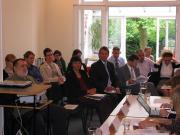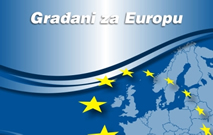REPORT - The right to be heard: The EU enlargment policy and civil society in the western balkans workshop
 Balkan Civil Society Development Network (BCSDN) in partnership with Aprodev organized a workshop under the title "The Right to Be Heard: The EU Enlargement Policy and Civil Society in the Western Balkans". The workshop took place on 10th September, 2009 in Brussels. It was attended by 42 representatives of local CSOs from the Balkan region, European Commission, European Parliament, EU networks as well as national governments and inter-governmental organizations from the region.
Balkan Civil Society Development Network (BCSDN) in partnership with Aprodev organized a workshop under the title "The Right to Be Heard: The EU Enlargement Policy and Civil Society in the Western Balkans". The workshop took place on 10th September, 2009 in Brussels. It was attended by 42 representatives of local CSOs from the Balkan region, European Commission, European Parliament, EU networks as well as national governments and inter-governmental organizations from the region.
The aim of the workshop was to discuss the current challenges faced by the countries in the Western Balkans and solutions to which local CSOs can contribute in solving. Specifically, the workshop focused on the IPA Civil Society Facility, which is the main EC funding mechanism in support of civil society development in potential and candidate countries and the IPA Partnership principle, which lays the legal basis for involvement of civil society actors in the IPA programming, implementation and evaluation.

On 9th September, an informal meeting between representatives of local CSOs from the Balkans and EU platforms was organized to share experience between the work of CSOs and networks in the EU pre-accession and accession context. The first panel "Civil Society a Partner in Policy- and Decision-Making: Lessons-learned on National and EU level" featured the presentation of Forum for Voluntary Social Work from Sweden and National Council of Voluntary Organizations from the UK, both national platforms active on the EU and European level. Two representatives of the BCSDN, Center for Information Service, Cooperation and Development of NGOs (CNVOS) from Slovenia and Civic Initiatives from Serbia gave their experience in both post- and pre-accession context. For the Swedish and UK national associations the work at the EU and European level (etc. through the Council of Europe) is crucial in order to be effective at the national level and to bring about changes at the lowest level. Although the experience in Slovenia and Serbia is affected by the EU integration process, it has not yet produced the desired effect, whereby the relations between the civil society sector and the Government would be institutionalized.

The second panel focused on "The Role of Civil Society in the Pre-Accession Period: Lessons-learned from 5th, 6th and Future Enlargements". The Social Platform, platform of European social NGOs presented its engagement and activities in the pre-accession countries, while two members of the BCSDN, Opportunity Associates Romania and Macedonian Center for International Cooperation presented their experience in how civil society performed as active players in the EU integration process of their countries. According to Social Platform, the experience in previous and current enlargement cycle has been that the accession process an especially the negotiations are technical and driven by economic issues, while the citizen's reality is of more social nature, not reflected in the process. The CSOs are the one faced with the causes and consequences of both. The Romanian case shows that the positive impact that the EU integration process might have on the strengthening of the civil society sector in the country and its role in the EU integration process, is neither permanent neither guaranteed, if it is not driven by the sector. In Macedonia, the experience is similar, although the sustainability of the benefits is still to be seen.
In the short discussion, one of the main issues and common problems faced by all CSOs was the issue of their legitimacy and representativeness, which is often disputed from the side of institutions one tries to influence. The participants arrived at a shared conclusion that the civil society sector should not be expected to replicate or mimic the governmental sector in trying to achieve representativeness and legitimacy. Rather, its role lays in providing additional mechanisms for citizens to express their view besides elected representativeness in a functioning democracy. This is especially needed to bring the views and needs of marginalized, non-voters (e.g. children) and other hard-to-reach voters and to give them the voice in the decision- and policy-making process.
The main conclusion and recommendations from the informal gathering were: the development of civil dialogue mechanisms is not only an issue faced by countries in the pre-accession context, but quite similar challenges are faced by the sectors in the established democracies and traditions in Europe. While the EU is a framework for cooperation, this can be limiting in the sense of joint activities (if funded by the EU) and in influencing policy and EU institutions (accession vs. pre-accession countries). However, for the civil society sector the EU context is not limiting as cooperation exists in the wider European context, transposing the EU divide. Such example is the cooperation in the context of the Council and Europe but also the ENNA network. When dialogue is non-existent or is not developed, the Slovenian case shows that new models (such as through IT technology) can provide for positive cases (although not a framework or a system) for cooperation and mutual benefits, thereof. But still, the Serbia case shows that even though positive cases of cooperation and engagement might exists, political will is crucial to close the complete circle of engagement. The EU integration process can be instrumental, but has not proved to be crucial or to have irreversible effect (such as in the case of Romania) on the improvement of both civil dialogue mechanisms and their functioning.
Read the full report: ''The EU enlargment policy and civil society in the western balkans workshop''.


